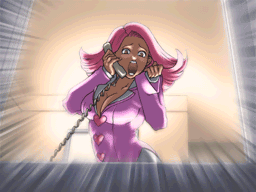For my first post in Feminist Gamers, I thought I’d follow my own advice and be more discerning of games and series that I enjoy. The big one that leaped to mind after playing through the fourth game in the series was the Ace Attorney series for the Nintendo DS, more commonly known as either Phoenix Wright or Apollo Justice.
A quick bit of background: the Ace Attorney series was developed by Capcom and the first game was released in Japan in 2001 for the Game Boy Advance. It went ahead to create 2 more games before concluding the trilogy. A re-release of the game was done in 2005, and because of its success, Capcom went on to create and release the fourth game (with a planned fifth spin-off) in 2007.
You play the games by taking control of Phoenix Wright or Apollo Justice for the most part, and you are a defense attorney. You spot contradictions in testimonies by confronting them with evidence, as well as investigate crime scenes and question people in order to build your case. The entire game plays like a visual novel, so the spice of life in this game are the characters.
Which brings us to stumbling block one: there are no protagonist black or even Japanese characters in the series. At all. There may be a few racially ambiguous characters, but they look like they had a tan. There is only one, ONE de facto black character in the entire series and he’s merely a photo in your court record because he’s a murder victim. I scanned Pat M.’s blog earlier when he posted in the open thread about race, and there he made a valid point: what would it be like to play the game if the protagonist was black, but the judge, jury, prosecutor, et al were white? It would certainly invite a new way of looking at law and, if the writers were subtle and particularly intelligent, highlight racial tensions. Unfortunately, this game is set in the near future, so racial problems could be handwaved as saying progress has done its part, which I don’t buy for a moment.
Now, stumbling block two: the often-times gratuitous portrayal of certain women in the series, especially Mia Fey, who is one of the main support characters. To its credit, Ace Attorney is surprisingly gender-equal, with women being as liable to be guilty of crimes as men, being as essential witnesses to the testimony, and holding positions of power in the series. (As an aside, for the people who have played this game, I will not touch on Franziska von Karma, the main prosecutor in the second game of the series, because I feel that she deserves a “getting to know” in the future.) However, for all of her skills as a defense attorney and personality, there is one aspect of Mia Fey that the graphic developers wanted to make sure that you didn’t miss: her breasts.
 Is this how she wins her trials?
Is this how she wins her trials?
Now, for the record, a female character can have large breasts and still be realistic if she has a human personality. After all, women with large breasts do exist in real life, and their size is no indicator of their personality or capability. Mia Fey is a good attorney and an intelligent, capable character, but her choice outfit screams male gaze. This particular example is not the worst, however…


 Different outfits for different channellings!
Different outfits for different channellings!
Now, these three can be explained. Mia Fey is a descendant of a family of spirit mediums, so her younger sister Maya Fey and cousin Pearl Fey can channel her spirit into their bodies and let her physically take over them so she can help out Phoenix in his times of need. Of course, she possesses their bodies with clothes their size, which makes for a tight (and revealing) fit. Somewhat tongue in cheek, the waitress costume is used to embarrass an old man and making him tell Phoenix what he knows because he is a sucker for women in waitress outfits. It’s unfortunate that Mia’s breasts were the focus of her sprites and outfits, rather than letting her face and personality dominate the scene by hiding the cleavage.
In passing to make my case, meet April May, whose breasts ACTUALLY JIGGLE in order to get every guy’s attention in the courtroom.
 The first time we see April May in the game.
The first time we see April May in the game.
All in all, however, the glaring omission of racial diversity and the almost wish fulfillment portrayal of Mia Fey in the game doesn’t detract from the fun. The first three games are a lot guiltier of these problems than the fourth, which is set farther in the future and has a whole new cast of characters that replace the old protagonists (and, conversely, Capcom has learned from their mistakes). I would appreciate it if Capcom had some tact and the will to create a black/Chinese/etc. character without resorting to graphical cues and offensive physical attributes, giving them the same life and memorability of other characters, but I’m not holding my breath.
